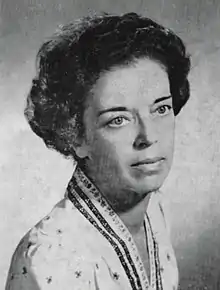Maria Floriani Squarciapino
Maria Floriani Squarciapino (1917-2003) was an Italian classical archaeologist and professor at La Sapienza University in Rome, known for her work on the Roman port city of Ostia.
Maria Floriani Squarciapino | |
|---|---|
 | |
| Born | 1917 |
| Died | 2003 (aged 85–86) |
| Occupation | Archaeologist |
| Academic work | |
| Discipline | Roman archaeology |
| Institutions | La Sapienza University; Ministry of Cultural Heritage and Activities (Italy) |
Education
Maria Floriano Squarciapino studied at La Sapienza University in Rome and was a student of Pietro Romanelli,[1] graduating in 1939 with a thesis on the topic of the school of Aphrodisias.[2][3][4] She also developed an interest in the archaeology of North Africa in the Roman period,[3] and underwent training at the Scuola nazionale di Archeologi.[1]
Career
Floriano Squarciapino became an inspector at the Soprintendenza for Ostia in 1946, where she worked closely with Italo Gismondi, Giovanni Becatti, Herbert Bloch and others.[3] After the publication of the excavations of the Ostian necropolis in 1959, Floriano Squarciapino turned her attention to the Ostia Synagogue, where she directed excavations in 1961–62.[5][6] In 1966 she became the superintendent of the Soprintendenza Archeologica di Ostia and held this position until 1974.[1] During the 1960s and 70s, Floriano Squarciapino also taught at La Sapienza, and in 1974 left the Soprintendenza Archeologica di Ostia to take up a position as Professor of the Archaeology and History of the Roman provinces (Archeologia e Storia delle provincie romane) at La Sapienza, which she held until her retirement in 1987.[2]
As well as her work at Ostia, Floriano Squarciapino also participated in excavations elsewhere, including the Roman Forum (1955–57), Leptis Magna, Tell Mardikh (1964–66) and in Albania.[4][2] A collection of her notes from excavations at Leptis Magna was published by Paola Finocchi in 2012.[7][8] Floriano Squarciapino also contributed to the Enciclopedia dell'Arte Antica, Classica e Orientale and led the editorial team at Fasti Archeologici from 1982 to 1997. She was the president of the Associazione Internazionale di Archeologia Classica, a member of the Pontificia Accademia Romana di Archeologia, the Istituto Nazionale di Studi Romani and the German Archaeological Institute.[3] In 1997 a special volume of the journal Archaeologica Classica was published in her honour.[9]
Awards
In 1975 Floriano Squarciapino was awarded the Antonio-Feltrinelli Prize, one of the most prestigious scientific awards within Italy.[10]
Select publications
Squarciapino published extensively on Ostia and Roman Archaeology in North Africa, including:[11]
- Artigianato e industria (= Civiltà Romana. Band 20). Colombo, Rome 1942.
- La Scuola di Afrodisia (= Studi e materiali del Museo dell’Impero Romano. Nr. 3). Governatorato di Roma, Rome 1943.
- Il Museo della Via Ostiense (= Itineraria dei Musei e Monumenti d’Italia.) Band 91. Istituto poligrafico dello Stato, Rome 1955.
- ed. with Italo Gismondi: Le tombe di età Repubblicana e Augustea (= Scavi di Ostia. Band 3: I necropoli. Teil 1). Istituto poligrafico dello stato, Rome 1958.[12]
- I Culti orientali ad Ostia. Brill, Leiden 1962.[13]
- Leptis Magna (= Ruinenstädte Nordafrikas. Band 2). Raggi, Basel 1966.
- Sculture del foro severiano di Leptis Magna. «L’Erma» di Bretschneider, Rome 1974.
- Civiltà romana: artigianato e industria.[14]
References
- "FLORIANI SQUARCIAPINO Maria (Roma, 1917 – 2003)" (PDF).
- "Maria Floriani Squarciapino (1917-2003)". www.ostia-antica.org. Retrieved 2020-04-20.
- "Maria Floriani Squarciapino (1917-2003)". www.ostia-antica.org. Retrieved 2020-02-10.
- (2012) 'Maria Floriani Squarciapino (1917-2003): una pioniera dell'archeologia italiana' in ed. Finocchi, P. Le sculture delle terme adrianee di Leptis Magna. Dagli appunti di M. Floriani Squarciapino. (9788890644306) https://www.researchgate.net/publication/316076583_Maria_Floriani_Squarciapino_1917-2003_una_pioniera_dell'archeologia_italiana
- "Sacred Space on the Shore: Ostia's Synagogue". www.ostia-foundation.org. Retrieved 2020-04-20.
- "OSMAP History of the Synagogue Site 1". www.laits.utexas.edu. Retrieved 2020-04-20.
- Finocchi, Paola (2012). Le sculture delle terme Adrianee di Leptis Magna. Dagli appunti di M. Floriani Squarciapino (in Italian). Espera. ISBN 978-88-906443-0-6.
- "HistLit 2014-2-066 / Lennart Gilhaus über Finocchi, Paola: Le sculture delle terme adrianee di Leptis Magna. Dagli appunti di M. Floriani Squarciapino. Rom 2012, in: H-Soz-Kult 28.04.2014".
- "Le province dell'Impero: Miscellanea in onore di Maria Floriani Squarciapino". Archeologia Classica. 49: VII–X. 1997. ISSN 0391-8165. JSTOR 44365843.
- "Premi Feltrinelli 1950-2011 | Accademia Nazionale dei Lincei". www.lincei.it (in Italian). Retrieved 2020-04-20.
- Baldassarri, Paola (1997). Bibliografia di Maria Floriani Squarciapino. In: Le province dell'Impero: Miscellanea in onore di Maria Floriani Squarciapino (= Archeologia Classica. Band 49). Rome: L’Erma» di Bretschneider. pp. XI–XVIII.
- Richardson, L. (1960). "Review of Scavi di Ostia III. Le Necropoli, Parte I". American Journal of Archaeology. 64 (2): 207–210. doi:10.2307/502562. ISSN 0002-9114. JSTOR 502562.
- Bakker, Jan Theo. M. Floriani Squarciapino, I culti orientali ad Ostia.
- "Civiltà romana: artigianato e industria. by SQUARCIAPINO Maria. | Libreria Oreste Gozzini snc". www.abebooks.co.uk. Retrieved 2022-01-20.